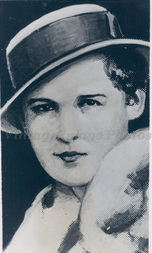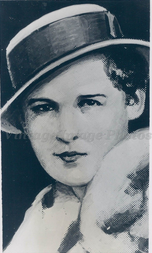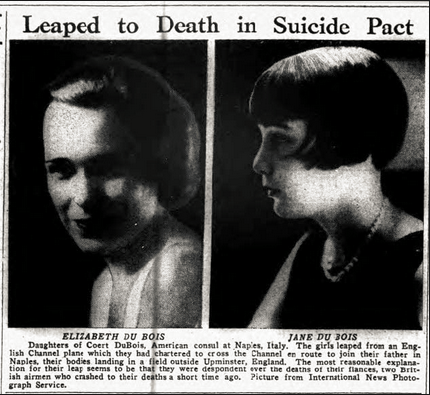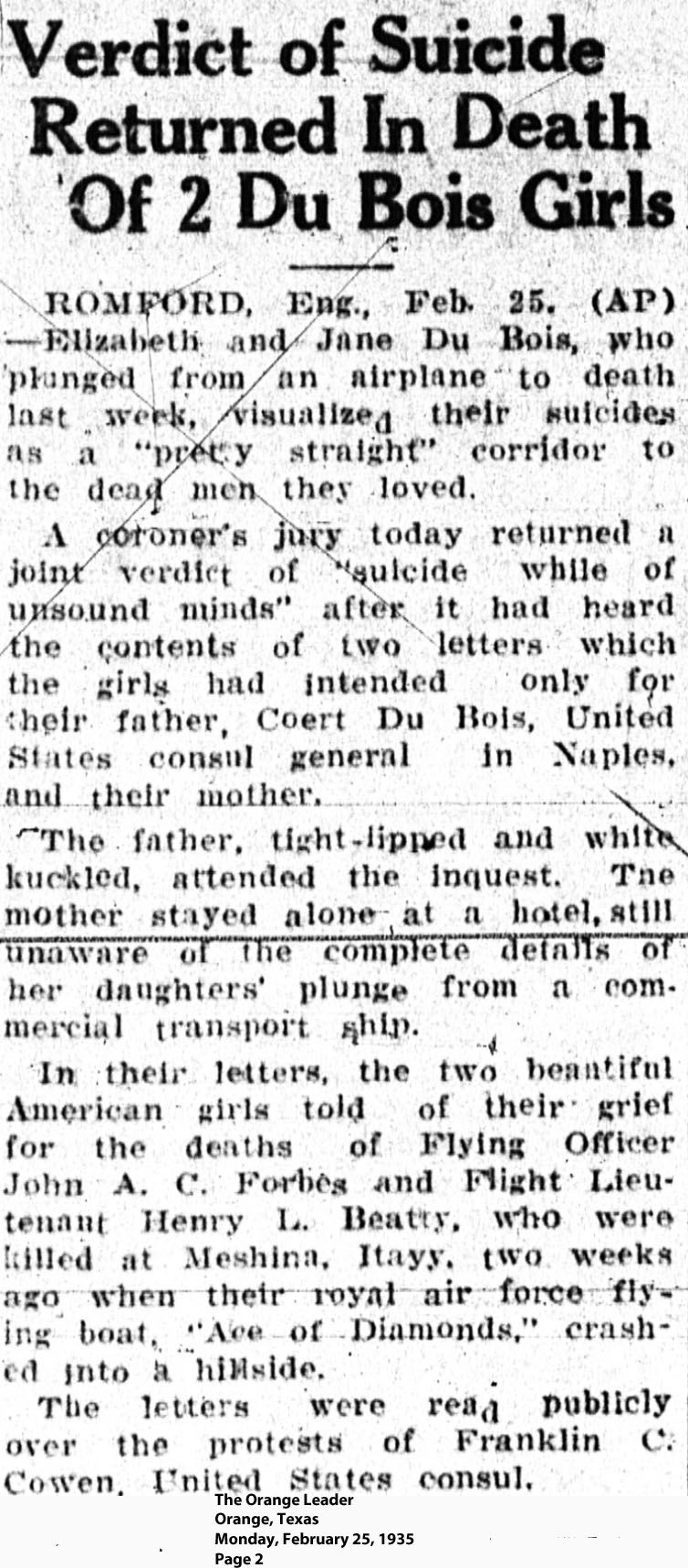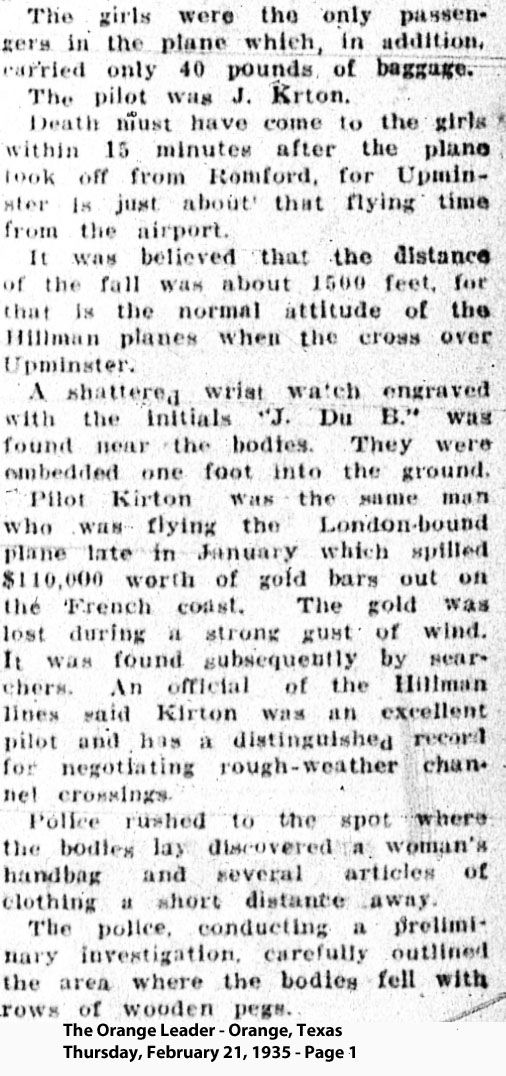LETTERS TELL STORY
Romford, England, Feb. 25—Two pitiful letters revealing the inconsolable grief of two beautiful American girls over the death of two British fliers were read today at the inquest into the double suicide of Jane and Elizabeth DuBois, daughters of the United States Consul-General at Naples, Italy. Clasped tightly together, the girls leaped to their deaths from a chartered airplane over Upminster, Essex on Thursday. After hearing the letters and other evidence, a Coroner's jury returned a verdict of "suicide while of unsound mind."
The fliers whom the girls joined in death were flying officer John Alexander Charles Forbes and flight lieutenant Henry Longfield Beatty, two of nine R.A.F. airmen killed in the crash of a huge British flying boat near Messina, Sicily. The girls had known the fliers for only ten days, their father, Coert DuBois, testified, but letters disclosed that both had fallen desperately in love with them.
The letters, written on blue paper and thoroughly legible, were signed "Jane and Betty." The girls wrote alternate paragraphs, indicating their dual determination to end their lives together. The first letter read: "Darling Coert: We have never explained things to you as we should. There has been so much doubt and worry. You have been kind to us and forgiven us much and you will forgive us this, as you must have felt a little of what we did when we heard of the flying boat crashing up. Do you remember Charles telling us about 'corridors' -- one before us seems pretty straight. Charles was engaged to another girl, but he was going to break it off and we would have been married this summer probably. There will never be anyone else for me. Comfort mother with all your strength. I think she will feel it was right as we do. Our love is with you. Now, God bless you. Betty and Jane."
The second letter, addressed to Mrs. DuBois, the former Margaret Mendell of Boston, follows: "Mother Darling: Do not doubt we are with you now and always with great love. Please don't think we have done anything wicked for we were given good proof that if there is a rule, an exception has been made for us. We went to St. Martin's Church in London because they were praying for Charles and John during the service. They knew we had not been confirmed but let us take Communion and we absolved our sins. The lesson was the parable of the laborers in the vineyard. You must have known when you heard of the crash in Sicily that it would pull us over a line which has never been well-defined for us. I think you know Charles and I were going to spend our lives together and I must keep my part of the bargain. It is all good. We have spent the day loaded with half crowns for the proletariat to drink to him. What is left in the bank is either Coert's or if it is considered ours, goes to R.A.F. widows. Darling, there is no one else on earth whom we could even hope to have understood. We are together and with you. We want there do nothing in this letter to hurt. (Note: This portion of the letter was slightly incoherent.) It is only sentimentalities that do that. Think of us as undivided and happy as we would never have been if our lives had become complicated with servants and more difficult with other people than we realized. Sure of our way and never far from you, we love, and that can never be broken or destroyed. You must not be discouraged if there be obscurities or difficulties. It will pass and you will find us if you haven't already. This is the greatest trust we have ever put in you. Forever, Betty and Jane."
The concluding paragraph was in the handwriting of Jane, the younger sister, who was 20 years old. Elizabeth was 23. The letters were read by the coroner himself, who overruled a proxy request by DuBois that the letters be withheld from publication. "Who would regard them as written by persons absolutely normal at the time?" he asked. "There can be no doubt that the girls jumped from the plane, and the letters show they were not in their right state of mind when they did it." The letters were handed over to the bereaved father. He made known the girls' bodies will be cremated and their ashes buried in Naples.
LETTERS TELL STORY
Romford, England, Feb. 25—Two pitiful letters revealing the inconsolable grief of two beautiful American girls over the death of two British fliers were read today at the inquest into the double suicide of Jane and Elizabeth DuBois, daughters of the United States Consul-General at Naples, Italy. Clasped tightly together, the girls leaped to their deaths from a chartered airplane over Upminster, Essex on Thursday. After hearing the letters and other evidence, a Coroner's jury returned a verdict of "suicide while of unsound mind."
The fliers whom the girls joined in death were flying officer John Alexander Charles Forbes and flight lieutenant Henry Longfield Beatty, two of nine R.A.F. airmen killed in the crash of a huge British flying boat near Messina, Sicily. The girls had known the fliers for only ten days, their father, Coert DuBois, testified, but letters disclosed that both had fallen desperately in love with them.
The letters, written on blue paper and thoroughly legible, were signed "Jane and Betty." The girls wrote alternate paragraphs, indicating their dual determination to end their lives together. The first letter read: "Darling Coert: We have never explained things to you as we should. There has been so much doubt and worry. You have been kind to us and forgiven us much and you will forgive us this, as you must have felt a little of what we did when we heard of the flying boat crashing up. Do you remember Charles telling us about 'corridors' -- one before us seems pretty straight. Charles was engaged to another girl, but he was going to break it off and we would have been married this summer probably. There will never be anyone else for me. Comfort mother with all your strength. I think she will feel it was right as we do. Our love is with you. Now, God bless you. Betty and Jane."
The second letter, addressed to Mrs. DuBois, the former Margaret Mendell of Boston, follows: "Mother Darling: Do not doubt we are with you now and always with great love. Please don't think we have done anything wicked for we were given good proof that if there is a rule, an exception has been made for us. We went to St. Martin's Church in London because they were praying for Charles and John during the service. They knew we had not been confirmed but let us take Communion and we absolved our sins. The lesson was the parable of the laborers in the vineyard. You must have known when you heard of the crash in Sicily that it would pull us over a line which has never been well-defined for us. I think you know Charles and I were going to spend our lives together and I must keep my part of the bargain. It is all good. We have spent the day loaded with half crowns for the proletariat to drink to him. What is left in the bank is either Coert's or if it is considered ours, goes to R.A.F. widows. Darling, there is no one else on earth whom we could even hope to have understood. We are together and with you. We want there do nothing in this letter to hurt. (Note: This portion of the letter was slightly incoherent.) It is only sentimentalities that do that. Think of us as undivided and happy as we would never have been if our lives had become complicated with servants and more difficult with other people than we realized. Sure of our way and never far from you, we love, and that can never be broken or destroyed. You must not be discouraged if there be obscurities or difficulties. It will pass and you will find us if you haven't already. This is the greatest trust we have ever put in you. Forever, Betty and Jane."
The concluding paragraph was in the handwriting of Jane, the younger sister, who was 20 years old. Elizabeth was 23. The letters were read by the coroner himself, who overruled a proxy request by DuBois that the letters be withheld from publication. "Who would regard them as written by persons absolutely normal at the time?" he asked. "There can be no doubt that the girls jumped from the plane, and the letters show they were not in their right state of mind when they did it." The letters were handed over to the bereaved father. He made known the girls' bodies will be cremated and their ashes buried in Naples.
Family Members
Sponsored by Ancestry
Advertisement
Records on Ancestry
Sponsored by Ancestry
Advertisement
